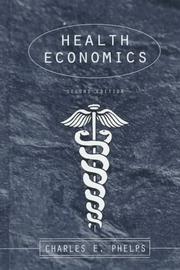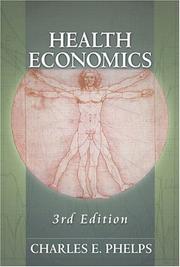| Listing 1 - 10 of 24 | << page >> |
Sort by
|
Book
Year: 1897 Publisher: New York : Appleton,
Abstract | Keywords | Export | Availability | Bookmark
 Loading...
Loading...Choose an application
- Reference Manager
- EndNote
- RefWorks (Direct export to RefWorks)

ISBN: 0673993981 Year: 1997 Publisher: Reading (Mass.): Addison-Wesley
Abstract | Keywords | Export | Availability | Bookmark
 Loading...
Loading...Choose an application
- Reference Manager
- EndNote
- RefWorks (Direct export to RefWorks)
Medical economics --- -Economics, Medical --- Health --- Health economics --- Hygiene --- Medical care --- Medicine --- Economic aspects --- Medical economics. --- -Medical economics --- Economics, Medical
Book
ISBN: 9781138207981 Year: 2018 Publisher: New York, NY : Routledge,
Abstract | Keywords | Export | Availability | Bookmark
 Loading...
Loading...Choose an application
- Reference Manager
- EndNote
- RefWorks (Direct export to RefWorks)
Medical economics. --- Medical care --- Economics, Medical --- Health Services Needs and Demand --- Insurance, Health --- Financial Management, Hospital --- Marketing of Health Services --- Health Policy --- Needs assessment --- Economic aspects. --- economics --- economics --- economics --- economics --- economics --- United States
Book
Year: 1901 Publisher: Boston Houghton Mifflin
Abstract | Keywords | Export | Availability | Bookmark
 Loading...
Loading...Choose an application
- Reference Manager
- EndNote
- RefWorks (Direct export to RefWorks)
Book
ISBN: 1315460483 1315460491 1315460475 Year: 2017 Publisher: Boca Raton, FL : Routledge, an imprint of Taylor and Francis,
Abstract | Keywords | Export | Availability | Bookmark
 Loading...
Loading...Choose an application
- Reference Manager
- EndNote
- RefWorks (Direct export to RefWorks)
Can we really use economic thinking to understand our health care system? Health Economics, now in its sixth edition, not only shows how this is done, but also provides the tools to analyze the economic behavior of patients and providers in health care markets.
Book
Year: 1982 Publisher: Santa Monica, CA : RAND Corporation,
Abstract | Keywords | Export | Availability | Bookmark
 Loading...
Loading...Choose an application
- Reference Manager
- EndNote
- RefWorks (Direct export to RefWorks)
This report analyzes the possible distributional consequences of several government policies for controlling health care costs. Drawing on the results of RAND's Health Insurance Study, it evaluates the potential savings from policies designed to increase cost sharing--deductibles and copayments--in both government and employer financed health insurance programs. It then examines how the cost of realizing these savings is distributed among major actors in the health care system--patients, doctors, hospitals, suppliers, insurers, and state and federal governments. The study assesses consequences of specific proposals to increase income taxation of employer financed insurance programs and to increase copayments in Medicaid.
Medical care, Cost of --- Health insurance --- Medical care --- Cost control. --- Deductibles and coinsurance. --- Health services --- Health insurance --- Cost control. --- Economics. --- Economics.

ISBN: 9780321068989 Year: 2003 Publisher: Boston (Mass) Addison-Wesley
Abstract | Keywords | Export | Availability | Bookmark
 Loading...
Loading...Choose an application
- Reference Manager
- EndNote
- RefWorks (Direct export to RefWorks)
Book
ISBN: 0190871172 0190871156 0190871164 0190871148 9780190871147 Year: 2021 Publisher: New York : Oxford University Press,
Abstract | Keywords | Export | Availability | Bookmark
 Loading...
Loading...Choose an application
- Reference Manager
- EndNote
- RefWorks (Direct export to RefWorks)
By reviewing different voting systems, their original intents, and their deficits, 'Making Better Choices' argues for a systems engineering approach to making better collective choices in society. Written by an economist and an engineer, this groundbreaking work draws from insights in sociology, linguistics, law, political science, philosophy, psychology, economics, and systems design. In an era of relentless rating, this book offers a fresh vision for engineering better democracies by enabling diverse choices.
Decision making. --- Social choice. --- Choice, Social --- Collective choice --- Public choice --- Choice (Psychology) --- Social psychology --- Welfare economics --- Deciding --- Decision (Psychology) --- Decision analysis --- Decision processes --- Making decisions --- Management --- Management decisions --- Problem solving --- Decision making --- Social choice
Book
ISBN: 0197686303 019768632X Year: 2024 Publisher: New York, NY : Oxford University Press,
Abstract | Keywords | Export | Availability | Bookmark
 Loading...
Loading...Choose an application
- Reference Manager
- EndNote
- RefWorks (Direct export to RefWorks)
Cost-effectiveness analysis (CEA) plays an important role in health policy debates, helping to shape resource allocation and pricing decisions. Yet many economists also recognise that the current framework can offer misleading and incomplete results. Current CEA methods imply that health improvements are equally valuable to those in good health and poor health, which fails to recognise the increased value of health improvements for those with severe illness or disability. This book introduces the generalised risk-adjusted cost-effectiveness (GRACE) model as a more accurate method for determining the value of medical treatments and technologies.
Medical economics. --- Medical care --- Value analysis (Cost control) --- Cost effectiveness. --- United States
Book
Year: 1992 Publisher: Cambridge, Mass. National Bureau of Economic Research
Abstract | Keywords | Export | Availability | Bookmark
 Loading...
Loading...Choose an application
- Reference Manager
- EndNote
- RefWorks (Direct export to RefWorks)
| Listing 1 - 10 of 24 | << page >> |
Sort by
|

 Search
Search Feedback
Feedback About UniCat
About UniCat  Help
Help News
News